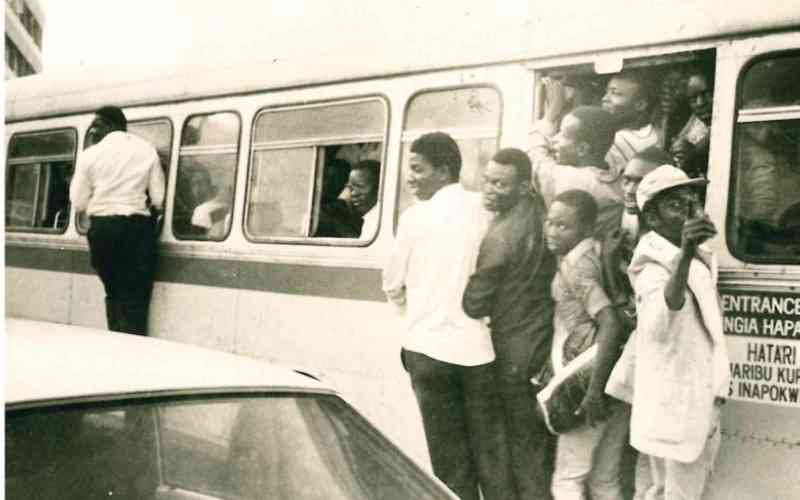
Public transport in the '90s was the worst experience anyone could have when moving from one place to another. It was a time when ramshackle and rickety jalopies ferried people around the villages and even some areas in Nairobi.
In my village, south of the Nakuru-Nairobi highway, a place called Ndeiya, tucked away on the outskirts of Limuru, we were transported by ridiculous vehicles from the Second World War era to and from Limuru.
The vehicles, notably Ford Anglias, Ford Cortinas, Colts, and some Datsun pickups masquerading as matatus, were the nganyas of our time.
These rickety cars, combined with the worst roads, made public transport a nauseating experience—one that was loathed by all. Ford Anglias and Cortinas drove along muddy and dusty roads in Ndeiya and elsewhere, with broken windows allowing dust to swirl in, leaving our girls’ and women’s shiny hair soiled by red soil dust. It was mandatory for any woman journeying anywhere to have a shuka to protect herself from the clouds of dust.
Women also had to carry an extra pair of shoes to town, as the ones they wore from home would arrive at their destination completely soiled by fellow passengers. It was the worst experience for women in matatus and dwarfed any modern predicament or concern.
When our lovely wives and girlfriends arrived in town, they had to do a makeover on their hair, confirm the contents of their purses, and stretch before heading to their destinations. It was common to see ladies sprucing each other up after the journey. This was the peak period of pickpocketing, and cramming passengers like sacks of potatoes provided fertile ground for pickpockets.
Often, cries echoed at bus terminuses as people wailed after discovering that their pockets had been harvested by crooks, who were abundant in these matatus. What remains unknown to this day is whether there was an unholy partnership between the matatu operators and the crooks to share the spoils of the day’s thefts.
However, not all was lost in this mode of transport. Those who rode on Datsun matatus, and especially those who rode in Colts, particularly in the Kikuyu area commonly referred to as Ngothi, had something to smile about.
The matatus had seats arranged in a way that made people look at each other at right angles, enabling men to steal glances at beautiful women and even muster a sheepish smile at them—an excellent way to make a move inside a matatu.
This was made easier because there were no distractions like phones to focus on; it was pure face-to-face interaction.
There was no swag in the rides, no music, and there was no graffiti on the walls. If today’s flashy nganyas are anything to go by, the rides were simply a repulsive and disgusting experience.
There were no mega TV screens showing music videos. The only noise in the '90s matatus was worn-out parts grinding against each other and wheels greeting potholes.
To make the experience even more unbearable, the touts of our time were sworn enemies, assaulting us with the worst armpit stench.
They wore no uniforms, which gave them the leeway to wear anything available. It was during this decade that the now official vulgar and unbecoming behaviour of touts was birthed; they held themselves as untouchable, their mouths running like word-churning machines spitting unprintables.
The worst part of '90s transport was that the rickety matatus were few, and people were stuffed in like sacks of potatoes. Any attempt to resist this kind of packing was met with a hail of insults from the touts. This was also the period when the crafty makangas discovered "kiti saucer"—a piece of wood that filled any space in the car to allow one more passenger.
I can certainly say there has been a paradigm shift in the public transport industry, from the worst to the now flashy and comfortable nganyas.